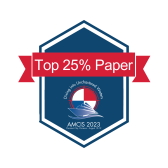Loading...
Paper Type
Complete
Description
The 2030 Agenda has pushed practitioners as well as academia to renew their efforts on promoting sustainability, e.g. in how digital technologies can support cities to improve their environmental performance. However, as scholars focus their attention on the positive outcomes of implementation, they often neglect the environmental impact of the artefact itself. We present a study of a Green IS implementation – a municipal Internet of Things (IoT) solution which was expected to decrease the carbon emissions produced by urban waste collection in Sweden. Using a mixed methods approach, we present qualitative findings from interviews & project meetings as well as quantitative findings from a Life Cycle Assessment (LCA). We find that (1) the environmental impact of the connected litter-bins – however small – is not necessarily offset by any significant benefits, and (2) the most significant way for the stakeholders to reduce environmental impact is to utilize more ecologically friendly trash bags
Paper Number
1354
Recommended Citation
Saarikko, Ted; Bomark, Sara; Lundström, Anders Jens; Brunklaus, Birgit; and Chiew, Yoon Lin, "The Trash is Always Greener on the Other Side: A Life Cycle Assessment of IOT Implementation" (2023). AMCIS 2023 Proceedings. 4.
https://aisel.aisnet.org/amcis2023/sig_green/sig_green/4
The Trash is Always Greener on the Other Side: A Life Cycle Assessment of IOT Implementation
The 2030 Agenda has pushed practitioners as well as academia to renew their efforts on promoting sustainability, e.g. in how digital technologies can support cities to improve their environmental performance. However, as scholars focus their attention on the positive outcomes of implementation, they often neglect the environmental impact of the artefact itself. We present a study of a Green IS implementation – a municipal Internet of Things (IoT) solution which was expected to decrease the carbon emissions produced by urban waste collection in Sweden. Using a mixed methods approach, we present qualitative findings from interviews & project meetings as well as quantitative findings from a Life Cycle Assessment (LCA). We find that (1) the environmental impact of the connected litter-bins – however small – is not necessarily offset by any significant benefits, and (2) the most significant way for the stakeholders to reduce environmental impact is to utilize more ecologically friendly trash bags
When commenting on articles, please be friendly, welcoming, respectful and abide by the AIS eLibrary Discussion Thread Code of Conduct posted here.




Comments
SIG Green